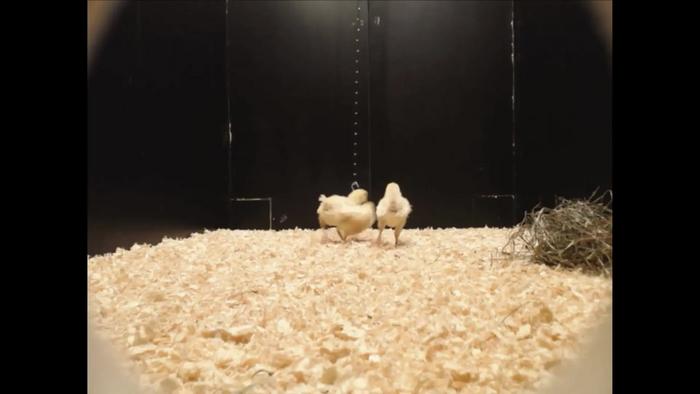Play is widespread, but far from ubiquitous, across the animal kingdom. Especially common in mammals, play is also known to occur in taxa as diverse as birds, fish, octopuses, and even insects. But what is its function, given that natural selection never selects fun for its own sake? One prominent hypothesis is that play is beneficial to individuals because it allows them to practice skills needed later in life.

Credit: Rebecca Oscarsson
Play is widespread, but far from ubiquitous, across the animal kingdom. Especially common in mammals, play is also known to occur in taxa as diverse as birds, fish, octopuses, and even insects. But what is its function, given that natural selection never selects fun for its own sake? One prominent hypothesis is that play is beneficial to individuals because it allows them to practice skills needed later in life.
Now, a study in Frontiers in Ethology has shown that male baby chickens play far more than females. This result is of interest given that domestic chickens are directly descended from a species – red jungle fowl – with a pronounced difference between the sexes in morphology, coloration, and behavior.
“Here we show for the first time that there are clear sex differences in the age-related development of play in chickens,” said first author Rebecca Oscarsson, a PhD student at Linköping University in Sweden.
“This difference is mainly because males engage more in social and object play.”
Red junglefowl were domesticated by humans between 7,000 and 8,000 years ago in mainland Southeast Asia. Multiple hybridization events took place since then, so that modern domestic chickens also carry genes from green, Sri Lankan, and grey junglefowl. In each of these species, males are more colorful, aggressive, and vigilant than females, and provide food for their mates.
Playpens
The researchers incubated white leghorn eggs from a farm, and determined the sex of each newborn chick from the length of its wings. They kept the chicks in cages with a sawdust floor, a heat-roof, and food and water throughout the experimental period. They then transferred the chicks to larger arenas or ‘playpens’ twice per week. The scientists observed the chicks for 30 minutes in these playpens and scored the occurrence within 15-second intervals of play by each chick. The chicks were observed on 15 different days, when they were between six and 53 days old.
The researchers distinguished 12 distinct play behaviors. Examples of locomotor play were frolicking and wing flapping. Object play included chasing an object or pecking at it or exchanging it with another chick. Social play included sparring, jumping, and sparring stand-offs.
10 minutes into the observations, the observer introduced a fake rubber worm into the playpen. This served to stimulate another type of object play: worm-running, where a chick carried the worm in its beak and ran around with it. Worm-running may be the play equivalent of ‘tidbitting’, a series of courtship behaviors while manipulating food items, which is done exclusively by adult males and directed at females.
Males play more
Object play was more frequently seen than social play, while locomotor play was least common. Both females and males showed every type of playful behavior. However, the frequency of play differed between them: male chicks played more overall than females. This was due to males engaging more often in object and social play, while there was no difference between the sexes in the frequency of locomotor play.
The frequency of play also depended on age since hatching: for males, this peaked around 43 days for males, and around 36 days in females, before gradually declining at later ages.
The researcher concluded that these sex differences in chicks in the frequency of play can be explained by the high degree of sexual dimorphism of adult junglefowl. This means that male chicks would benefit more from practicing various skills related to physical ability and social tactics.
Practice for later in life
“We still don’t know the adaptive function of play for any species,” said author Dr Per Jensen, a professor at Linköping University and Oscarsson’s academic supervisor.
“However, the present study indicates that a possible function is to prepare animals for specific challenges they may encounter later in life. In a species like the chicken, where only males compete for territories, it makes sense that they engage in more social play as young.”
“Many questions remain unanswered with respect to the adaptive functions of play, for example its effects on later cognitive abilities. We now plan to look into the neurobiological and genetic mechanisms of play. For example, it’s possible that the early development of the cerebellum is linked to play behavior,” said Jensen.
Journal
Frontiers in Ethology
DOI
10.3389/fetho.2024.1392378
Method of Research
Observational study
Subject of Research
Animals
Article Title
Male chicks play more than females – sex differences in chicken play ontogeny
Article Publication Date
2-May-2024
COI Statement
The authors declare that the research was conducted in the absence of any commercial or financial relationships that could be construed as a potential conflict of interest




